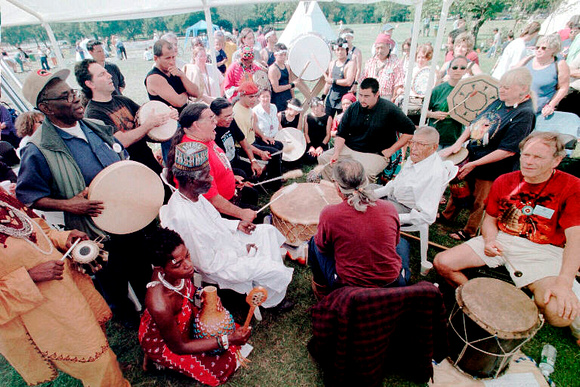0764: Honoring Babatunde Olatunji
"Rhythm is the soul of life.
The whole universe revolves in rhythm.
Everything and every human action revolves in rhythm."
Babatunde Olatunji was born 1927 in the small village of Ajido, Nigeria, about forty miles from Lagos, the capital of the country. This small fishing and trading town amplified the ebb and flow of the seasons through the sounds of drumming that echoed through the nights.
As a child, Olatunji accompanied his great aunt Tanyin to hear the drums - hollowed out from trees and covered with the skin of goats - punctuate the lives of his people. The drummers celebrated every occasion, proclaimed the coming of local politicians, evoked the dreams and aspirations of their people. The drumbeat of his childhood became the life blood of his adult experience as Olatunji grew and traveled throughout the world popularizing the music of his Yoruban heritage.
While still in Africa in the late '40s, the ever resourceful Olatunji read in Reader's Digest about the Rotary International Foundation scholarships offered to youths from war-affected countries. By 1950, Olatunji and his cousin were each awarded a scholarship and were on their way to America to attend school in Atlanta, Georgia. Olatunji came to the U.S. determined to succeed in the international arena, at the time he had no aspirations to be a musician.
In 1954, after graduating from Atlanta's Moorehouse College with a degree in Diplomacy, Olatunji moved to New York to begin a Political Science postgraduate program in Public Administration at New York University. Throughout his American education he had a unique perspective on the cultural divides between black and white Americans. Early on he realized that music, drumming in particular, had the ability to break down the long-established cultural divisions within the "Melting Pot" that America was thought to be in those days. These sorts of insights were the motivating factor that brought Olatunji to begin performing the drumming of his Yoruba ancestors.
To cover his expenses he started a small drumming and dance group. Recognizing the influence of African polyrhythms in jazz, some of Olatunji's earliest fans were the jazz greats of the time; men like John Coltrane, Yusef Lateef, Clark Terry, George Duvivier, Count Basie, Duke Ellington, Quincy Jones, Taj Mahal, Pete Seeger, Bill Lee (Spike Lee's father), and Dance luminary Alvin Ailey; not to mention the legendary noted Columbia A&R man John Hammond who produced Olatunji's first album. Even Dr. Martin Luther King, Jr., (also a Moorehouse graduate) invited Olatunji to tour with him.
In 1957 when Columbia Records producer John Hammond heard Olatunji performing at Radio City Music Hall with a 66-piece orchestra, he was so impressed that this fortuitous meeting led directly to the recording of Drums of Passion. Released in 1959 by Columbia Records, Olatunji's first album became an unprecedented, worldwide smash hit. It was the first album to bring genuine African music to Western ears, and it went on to sell over five million copies and is still a popular recording.


